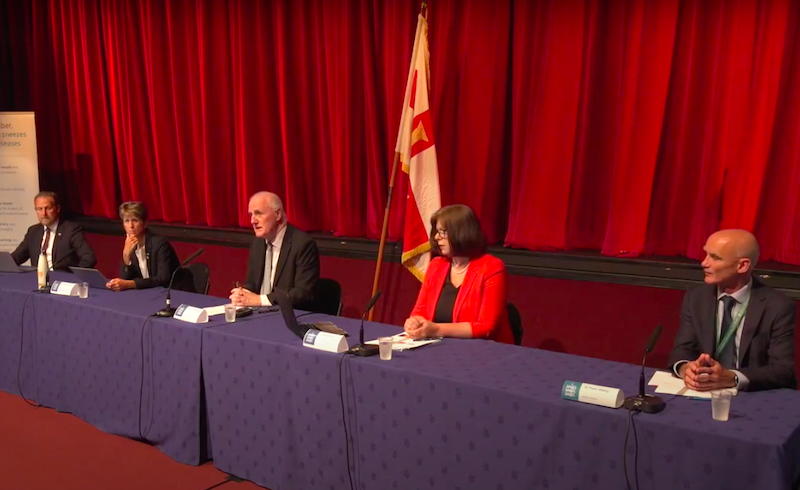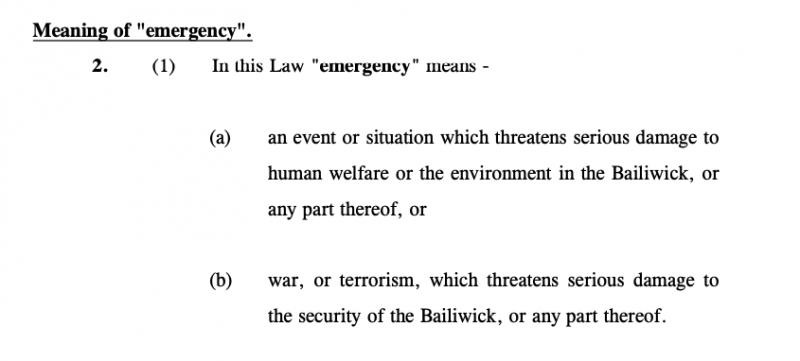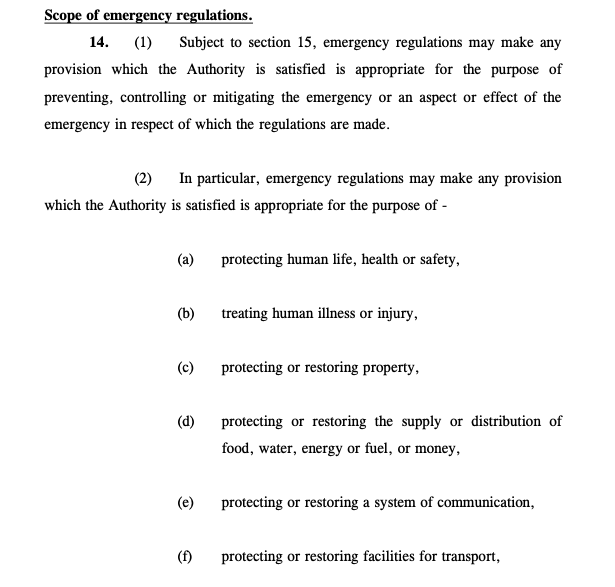


There remains no indication of when the CCA's emergency decision-making powers will be ceded back to the States, or what the future arrangements will look like, as the Bailiwick 'learns to live' with covid.
The Civil Contingencies Authority has held its extraordinary powers since March 2020, with six voting politicians deciding the laws that people in the Bailiwick must adhere to during the Covid-19 pandemic.
Its former Chairman Gavin St Pier has asked his replacement, Deputy Peter Ferbrache, on what definition of 'emergency' the Civil Contingencies Authority continues to satisfy itself that these powers remain justified and proportionate.

Pictured: Deputy St Pier asked on what basis there remains an 'emergency', as defined by the Civil Contingencies Law 2012.
He asked: “Given, firstly, at 27 August, 89% of the Bailiwick’s adult population are fully vaccinated; secondly, we now know from recent studies, the risk of severe Covid is 0.135% and vaccination reduces this is by 90%; therefore the risk to human life, human illness or the disruption of services relating to health is significantly reduced.
“Given too that the CCA have advised that in their view Covid will be with us for some time and the Bailiwick needs to ‘learn to live with Covid responsibly’ as part of normal life, on what basis is the CCA satisfying itself that an ongoing ‘emergency’ exists within the meaning and definition of section 2?”
Deputy Ferbrache, CCA Chairman since October 2020, said the legislation underpinning the CCA does not define when a situation ceases to be an ‘emergency’.
“Rather, it recognises that the effects or impact of an emergency may extend beyond an actual event,” he argued.
“Section 13 sets out four conditions which must be satisfied before the Authority may make any emergency regulations and the first two of these refer specifically to an emergency.
“The first condition is that an emergency has occurred, is occurring or is about to occur. The second condition is that the regulations are necessary for the purpose of preventing, controlling or mitigating the emergency or aspects or effects of the emergency.
“The Authority is satisfied that, although the Bailiwick is moving towards living responsibly with Covid, the coronavirus pandemic has and still is occurring. The vaccine does not stop a person contracting Covid-19.”

Pictured: In line with Section 15 of the Law, Deputy Ferbrache said the CCA can make regulations for the purpose of preventing, controlling or mitigating what otherwise would or could be an emergency situation.
Approximately 53% of islanders were unvaccinated when the CCA opened Guernsey’s borders in July, before many younger people had been given the chance for two doses of a Covid-19 vaccination.
Deputy Ferbrache said it was “relevant” now, in defining the continuing 'emergency', that 22% of the population remain unvaccinated, mostly those aged under 16 years of age.
“This situation, together with other, frequently changing factors, risks potential disruption to the Bailiwick’s health service and knock on consequences in terms of either human illness or loss of life.
“Therefore, the Authority is satisfied that a situation which threatens serious damage to human welfare still exists, in accordance with section 2 of the law.
“Further, the Authority is considering a number of options for alternative legislation under which to make such regulations as may be required going forward as the world moves from a pandemic to a position where Covid-19 is endemic."

Pictured: It has been suggested by some in the States that Health & Social Care - whose Committee is pictured - would be better placed to manage the ongoing health implications of Covid-19, as the Bailiwick learns to live with the virus.
Deputy Ferbrache could not offer a timeframe for when this might happen. He has previously stated that the CCA should not retain its emergency powers any longer than necessary for managing the effects of the pandemic.
He repeated that point in the States: “The CCA would love to be in a situation to say it doesn’t have to make these regulations anymore, our duties are over, we need to move forward. But we are not there yet.
“I can’t say whether it should be three months, I can’t say it should be six months, but I can say it should be a limited period of time.”
Deputy John Gollop asked Deputy Ferbrache to consider, as a "halfway house", transferring the CCA's powers back to Health & Social Care.
Deputy Peter Roffey sought further explanation on the continuation of emergency and extraordinary powers when the island has a Government which is otherwise operating as normal.
Deputy Ferbrache told the States that any Deputies unhappy with the current arrangements should lay a requete - which requires seven signatories - to force a States debate on the matter.
There is no special election for the CCA - its constitution is statutory and includes the Presidents of Policy & Resources, Health & Social Care, Home Affairs and Environment & Infrastructure, plus nominated representatives from Alderney and Sark’s Governments.
Those six voting members are advised by a small number of senior officers, such as the Director of Public Health, Dr Nicola Brink, the Medical Director, Dr Peter Rabey, and the States CEO, previously Paul Whitfield, now Mark de Garis.
Comments
Comments on this story express the views of the commentator only, not Bailiwick Publishing. We are unable to guarantee the accuracy of any of those comments.